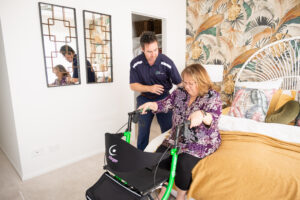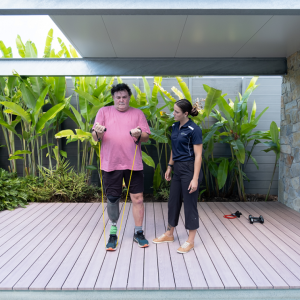How NDIS Mobile Services Enhance Participant Independence

For NDIS participants, achieving greater independence isn’t just an ideal—it’s a fundamental goal supported by the National Disability Insurance Scheme. At Team Rehab Solutions, we understand that true independence comes from receiving the right support in the right setting. Increasingly, that setting is the participant’s own home.
Mobile NDIS services, including mobile physiotherapy, occupational therapy, and speech therapy, are helping individuals across Australia reach personal goals, develop confidence, and live more independently—all from the comfort and familiarity of their own environment.
In this article, we explore how mobile NDIS services work, why they matter, and how they can be leveraged to improve outcomes for participants.
What Are Mobile NDIS Services?
Mobile NDIS services refer to allied health support delivered directly to a participant’s home, school, or community environment. Whether it’s mobile physiotherapy, occupational therapy, or other therapeutic disciplines, this approach offers convenience, flexibility, and individualised care.
Unlike traditional clinic-based care, mobile services bring the therapist to the participant. This removes many logistical and emotional barriers, particularly for those with limited mobility, transport challenges, or anxiety in clinical settings.
These services are fully eligible for funding under the NDIS, and can be integrated into a participant’s Core Supports or Capacity Building budgets depending on the nature of the service.
The Benefits of Receiving Support at Home
One of the most significant advantages of in-home disability support is the ability to tailor therapy to the participant’s real-world environment. This means therapists can assess and adapt routines in the exact space where participants live, move, and interact daily.
Additional benefits include:
- Comfort and familiarity: Being at home puts participants at ease, increasing their willingness to engage in sessions.
- Reduced travel stress: No need to navigate public transport or rely on carers to get to a clinic.
- Goal-directed therapy: Mobile services allow therapists to align treatment with practical, everyday tasks.
- Consistency and continuity: It’s easier to maintain regular sessions, helping to build momentum and measurable outcomes.
How Mobile Physiotherapy Builds Confidence and Function

NDIS physiotherapy delivered at home offers significant advantages for improving strength, mobility, and independence. A mobile physiotherapist can assess home safety, demonstrate exercises using everyday household items, and provide recommendations for assistive equipment.
Imagine a participant with reduced lower limb strength following a neurological condition. In a clinic, they might practice standing from a generic chair. At home, they can work with their therapist on transferring from their actual bed or bathroom setup—leading to more meaningful functional gains.
Mobile physiotherapy supports:
- Falls prevention
- Balance and gait training
- Rehabilitation after surgery or injury
- Functional strength for daily activities like showering, cooking, or getting in/out of bed
The result? Greater autonomy, reduced risk of injury, and enhanced disability independence.
Empowering Participants to Set and Achieve Personal Goals
Mobile therapy doesn’t just offer convenience—it plays a critical role in building capability. By setting therapy in the context of a participant’s own space and lifestyle, it becomes easier to set realistic, personalised goals that truly matter.
For example:
- A participant may want to be able to independently prepare a meal.
- Therapy at home can break that task down into achievable steps—standing at the bench, reaching for utensils, maintaining balance at the stove.
- Each session is then focused on reaching a milestone toward that bigger, more meaningful goal.
When therapy reflects the participant’s environment, engagement increases—and so does progress.
NDIS Plan Flexibility & Choosing the Right Mobile Provider
The NDIS allows participants to choose how and where they receive services. Including mobile support in your plan is straightforward—especially with the help of a support coordinator or plan manager.
When choosing a mobile NDIS provider, consider:
- Are they NDIS registered?
- Do they offer a multidisciplinary approach (e.g., physio, OT, speech)?
- Do they focus on goal-setting and outcomes tracking?
- Are therapists experienced in working with a diverse range of disabilities?
At Team Rehab Solutions, we pride ourselves on delivering collaborative, client-centred care across multiple allied health disciplines. Our mobile therapy teams work together to ensure every participant receives tailored support that leads to long-term functional gains.
Mobile NDIS services are more than just a convenience—they are a powerful tool for building independence, achieving personal goals, and improving quality of life. From mobile physiotherapy to comprehensive allied health support, in-home therapy meets participants where they are—literally and figuratively.
At Team Rehab Solutions, we believe every NDIS participant deserves the opportunity to thrive in their own environment. If you’re looking to maximise the benefits of your NDIS plan with flexible, expert care delivered at home, we’re here to help.
Talk to our team today by calling 1300 685 046 or filling in the contact form and find out how we can support your goals through tailored in-home services.
